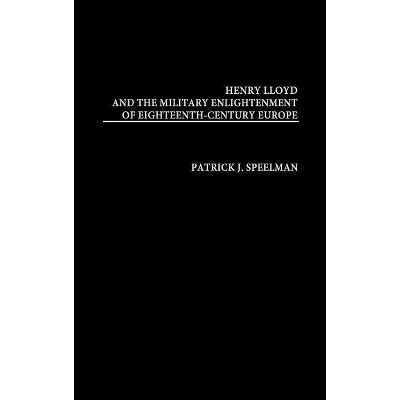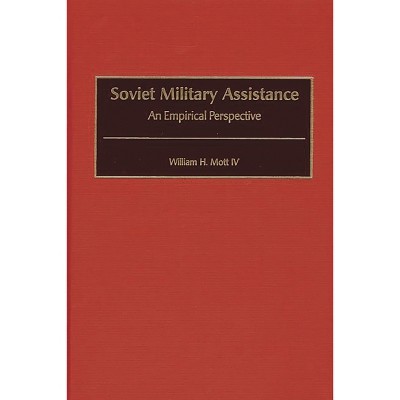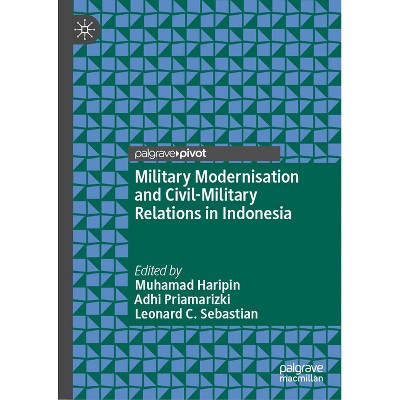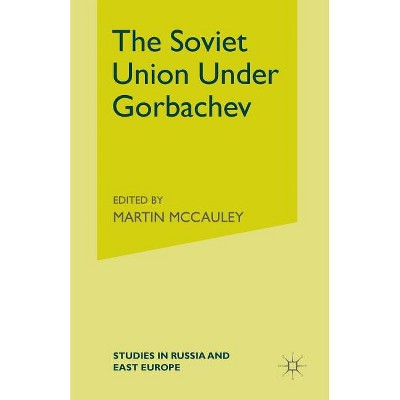Sponsored

The Evolution of Civil-Military Relations in East-Central Europe and the Former Soviet Union - (Contributions in Military Studies) (Hardcover)
In Stock
Sponsored
About this item
Highlights
- The dismantlement of the communist system of control of the military and its replacement with a democratic model is one of the most significant aspects of the post-communist transition in East-Central Europe and the former Soviet-Union.
- About the Author: NATALIE L. MYCHAJLYSZYN is an Assistant Professor in the Department of Political Science, Concordia University in Montreal, Canada.
- 256 Pages
- Social Science, Ethnic Studies
- Series Name: Contributions in Military Studies
Description
About the Book
The dismantlement of the communist system of control of the military and its replacement with a democratic model is one of the most significant aspects of the post-communist transition in East-Central Europe and the former Soviet-Union. The success of democratic civil-military reforms is an important and underappreciated measure of the state of democratic transitions in these countries, and it also has important implications for and links with regional security and NATO relations. This book examines the state of democratic civil-military reforms in nine East-Central and former Soviet states: Czech Republic, Hungary, Poland, Estonia, Latvia, Lithuania, Bulgaria, Russia, and Ukraine.
An examination of these states is of particular interest and importance given their varied relationship with NATO, a relationship that is influenced to a large extent by the amount of progress in reforming their post-communist system of control of their militaries. Following a comprehensive theoretical chapter on civil-military relations, the individual chapters consider the accomplishments as well as the outstanding shortcomings of democratic civil-military reforms. Overall, the book argues that the weaknesses apparent in all these countries in the implementation of the democratic norms of civilian control of the military require continued attention in order to strengthen not only the relationship with NATO (wither membership is already obtained or sought) but also regional security in general.
Book Synopsis
The dismantlement of the communist system of control of the military and its replacement with a democratic model is one of the most significant aspects of the post-communist transition in East-Central Europe and the former Soviet-Union. The success of democratic civil-military reforms is an important and underappreciated measure of the state of democratic transitions in these countries, and it also has important implications for and links with regional security and NATO relations. This book examines the state of democratic civil-military reforms in nine East-Central and former Soviet states: Czech Republic, Hungary, Poland, Estonia, Latvia, Lithuania, Bulgaria, Russia, and Ukraine.
An examination of these states is of particular interest and importance given their varied relationship with NATO, a relationship that is influenced to a large extent by the amount of progress in reforming their post-communist system of control of their militaries. Following a comprehensive theoretical chapter on civil-military relations, the individual chapters consider the accomplishments as well as the outstanding shortcomings of democratic civil-military reforms. Overall, the book argues that the weaknesses apparent in all these countries in the implementation of the democratic norms of civilian control of the military require continued attention in order to strengthen not only the relationship with NATO (wither membership is already obtained or sought) but also regional security in general.Review Quotes
?[A]n exceptional compilation of case studies....[s]heds much light on the democratic progress of Eastern Europe with regard to civil-military relations....This book provides an excellent starting point for evaluating civil-military relations in Eastern Europe....For those looking for concise and substantive examinations of these states in a single volume, there is no better compilation at this time.?-Journal of Slavic Military Studies
?Recommended. Research and professional collections.?-Choice
"ÝA¨n exceptional compilation of case studies....Ýs¨heds much light on the democratic progress of Eastern Europe with regard to civil-military relations....This book provides an excellent starting point for evaluating civil-military relations in Eastern Europe....For those looking for concise and substantive examinations of these states in a single volume, there is no better compilation at this time."-Journal of Slavic Military Studies
"[A]n exceptional compilation of case studies....[s]heds much light on the democratic progress of Eastern Europe with regard to civil-military relations....This book provides an excellent starting point for evaluating civil-military relations in Eastern Europe....For those looking for concise and substantive examinations of these states in a single volume, there is no better compilation at this time."-Journal of Slavic Military Studies
"Recommended. Research and professional collections."-Choice
About the Author
NATALIE L. MYCHAJLYSZYN is an Assistant Professor in the Department of Political Science, Concordia University in Montreal, Canada. Her research interests include security institutions, civil-military relations, conflict prevention and resolution, ethnic politics, and international relations in the Post-Soviet region.
HARALD VON RIEKHOFF is Professor of Political Science, Carleton University in Ottawa, Canada. He is the author and editor of numerous books dealing with German foreign policy, NATO, arms control, Canada-U.S. relations, and the revolution in military affairs.










